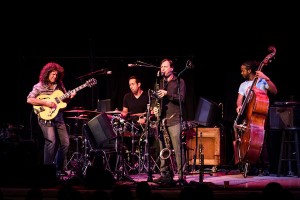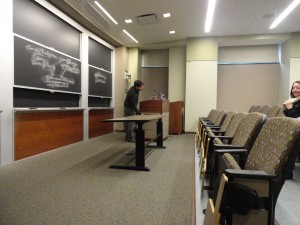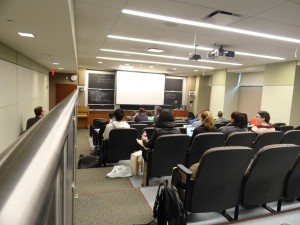February 5, 2013 at 12:53 pm
Relating to CC202's study of Walt Whitman's work, here is an extract of the article by Claire Kelley on the poet's whereabouts while he was writing in 1855:
“Whitman-iacs” like NYU Professor Karen Karbiener have paid their respects to the ghost of Walt Whitman by visiting the unassuming white house that stands one story taller than the others next to it... As Berman says, "Anybody who has spent a little time over “Leaves of Grass” ought to be able to understand why one or another long-lost building associated with Whitman might incite a bit of feeling."
For the full article, visit http://bit.ly/WMrlVr
Here is a sample from the poem Song of Myself, from Walt Whitman's Leaves of Grass:
I celebrate myself, and sing myself,
And what I assume you shall assume,
For every atom belonging to me as good belongs to you.
I loafe and invite my soul,
I lean and loafe at my ease observing a spear of summer grass.
My tongue, every atom of my blood, form'd from this soil, this air,
Born here of parents born here from parents the same, and their
parents the same,I, now thirty-seven years old in perfect health begin,
Hoping to cease not till death.
Creeds and schools in abeyance,
Retiring back a while sufficed at what they are, but never forgotten,
I harbor for good or bad, I permit to speak at every hazard,
Nature without check with original energy.
By mdimov
|
Posted in Academics, Community, Curriculum
|
Tagged article, CC202, ghost, living, poem, space, time, Walt Whitman, whispers
|
January 31, 2013 at 2:16 pm
Some spring semesters, CC202 studies the works of John Keats. Here is an interesting untitled fragment the Romantic poet scribbled in a margin:
This living hand, now warm and capable
Of earnest grasping, would, if it were cold
And in the icy silence of the tomb,
So haunt thy days and chill thy dreaming nights
That thou would wish thine own heart dry of blood
So in my veins red life might stream again,
And thou be conscience-calmed—see here it is—
I hold it towards you.
A thought-provoking discussion about it: http://bit.ly/14tGbSY
By mdimov
|
Posted in Academics, Art, Curriculum, Quotes
|
Tagged dark, discussion, gloomy, hand, interesting, John Keats, ominous, poem, poet, poetry, tomb
|



